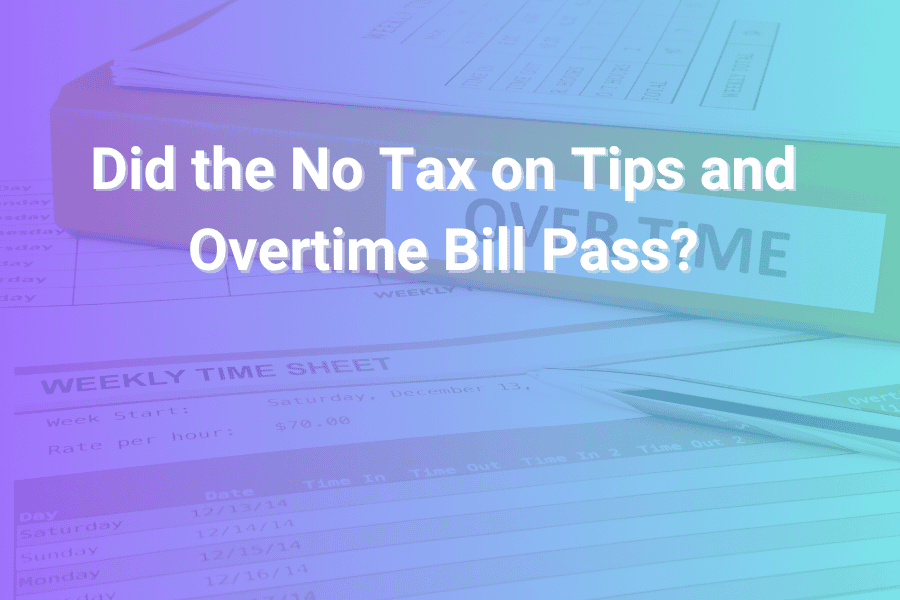
The debate over taxes on tips and overtime pay has been a significant issue for workers in the United States, particularly for those in service industries where tipping is common. The passage of the One Big Beautiful Bill, a sweeping piece of legislation aimed at addressing a range of economic concerns, has introduced a provision that seeks to exempt these earnings from federal income tax. But did the No Tax on Tips and Overtime bill actually pass, and what does it mean for workers?
In this article, we will explore the No Tax on Tips and Overtime Bill, including the details of the provisions, the impact on workers, the criticisms of the bill, and whether it is truly beneficial for those it is meant to help.
We will break down the provisions of the bill, analyze its effects on different income groups, and discuss the long-term implications of such legislation.
What is the No Tax on Tips and Overtime Bill?
The No Tax on Tips and Overtime bill is part of the One Big Beautiful Bill passed in July 2025. The legislation aims to provide relief to workers in certain industries, particularly those who rely heavily on tips, such as servers, bartenders, and other hospitality workers. Under this bill, employees in tipped occupations are allowed to deduct up to $25,000 of their tip earnings from their taxable income, while workers who earn overtime pay are similarly eligible for a tax exemption, with a cap of $12,500 in overtime pay. These provisions are designed to reduce the taxable income of workers who depend on variable earnings, providing them with more financial flexibility.
The bill was touted as a significant victory for low-wage workers in the service industry, many of whom struggle with inconsistent earnings due to the nature of their work. By eliminating federal taxes on tips and overtime, the government hoped to level the playing field and ensure that these workers could retain more of their hard-earned money.
Key Provisions and Eligibility
The One Big Beautiful Bill offers an income tax exemption on tips and overtime pay, but with clear eligibility requirements and limitations. Here’s a breakdown of the key provisions:
- No Tax on Tips:
- Tipped workers—such as waitstaff, bartenders, and bellhops—are allowed to deduct up to $25,000 in tips from their taxable income.
- The provision applies only to workers who report their tips accurately, typically through IRS forms like W-2 or 1099.
- The $25,000 cap is designed to target those who rely primarily on tips to supplement their income. This cap is phased out for higher-income earners, with individuals who make more than $150,000 (single) or $300,000 (married) not being eligible.
- No Tax on Overtime:
- Workers who earn overtime are also allowed to deduct up to $12,500 of their overtime pay from their taxable income.
- This provision aims to help workers in industries where overtime is common, including retail, manufacturing, and other hourly wage jobs.
- Like the tip provision, eligibility for the overtime deduction phases out at a certain income level, ensuring that the benefit is directed at lower- to middle-income workers.
Did the Bill Pass?
The No Tax on Tips and Overtime provisions were officially passed as part of the One Big Beautiful Bill in July 2025. The bill was signed into law with the aim of providing tax relief to low-income and hourly workers in the United States. The tax cuts apply to both tips and overtime pay through 2028, offering significant financial relief to those who work in industries where such payments are prevalent.
However, while the bill passed with broad support, not everyone believes it goes far enough to address the true needs of workers in these industries. Some critics argue that the provisions do not offer enough long-term financial support and that higher-income earners may still find ways to benefit disproportionately from the legislation. Moreover, some workers may not benefit if their tip earnings do not exceed the $25,000 cap, or if their overtime pay is not substantial enough to meet the $12,500 threshold.
What Does This Bill Mean for Workers?
The bill is a mixed bag for workers. On the one hand, it offers a financial boost to those who rely on tips and overtime pay, ensuring they are not taxed on earnings that are often unpredictable. However, it also leaves room for criticism in several areas:
Positive Impact on Workers:
- Increased Take-Home Pay: Workers in tipped positions, such as restaurant servers or bartenders, will no longer have to pay federal taxes on their tip income up to $25,000. This could result in significant tax savings for those in industries with fluctuating income streams.
- Reduced Financial Stress: The overtime provision ensures that workers who put in extra hours are not penalized with higher taxes, helping them retain more of their income.
- Targeted Relief for Low-Income Workers: The income caps make the provisions more targeted, ensuring that workers who earn higher wages (often through other means) do not unfairly benefit from these tax exemptions.
Negative Criticisms of the Bill:
- Limited Scope: Many critics argue that the $25,000 cap on tips is insufficient for many workers in high-tip industries. Some restaurant servers, especially in larger cities, can earn significantly more in tips, and the bill may fail to fully benefit them.
- Ineffective for High Earners: Some workers who consistently earn high overtime or tip income may find that they are unable to fully take advantage of the bill, given the income limits that phase out the exemptions.
- Potential for Exploitation: Critics also fear that employers might exploit the tax cuts to further reduce wages, knowing that their workers will retain more of their earnings through the tax exemptions.
The Broader Economic Impact
The No Tax on Tips and Overtime provisions are part of a larger effort to reform the U.S. tax code and provide relief to workers in industries where tips and overtime are common. While the provisions do offer a degree of financial freedom to workers, the bill’s other provisions, including cuts to social services and healthcare programs, may undermine its positive effects. These cuts, which critics argue disproportionately affect low-income workers, may reduce the overall benefit for individuals who depend on these programs for their livelihood.
Furthermore, there are concerns about the long-term impact of such tax relief. Although workers may enjoy temporary financial relief, the reduction in federal revenue could result in cuts to vital programs, like SNAP and Medicaid, which provide much-needed assistance to low-income families. Critics argue that this could leave workers in a worse position over time, despite the immediate tax savings.
Conclusion
In conclusion, the No Tax on Tips and Overtime bill has passed, offering temporary tax relief for millions of workers in the U.S. who depend on tips and overtime pay. While the provision brings positive benefits for many workers, it also leaves room for criticism.
The $25,000 cap on tips and $12,500 cap on overtime pay may not be enough to fully address the financial struggles of workers in high-tip or overtime-heavy jobs. Moreover, the bill’s broader economic implications, including cuts to social services, could ultimately undermine the benefits it provides.
In the end, while the One Big Beautiful Bill represents a significant shift in tax policy for tipped and hourly workers, its long-term benefits and drawbacks remain a matter of debate.
